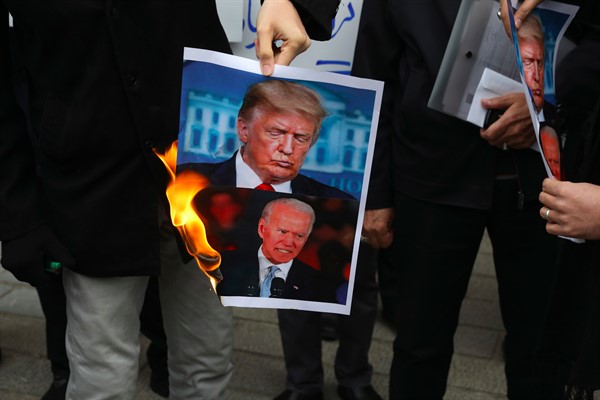Many world leaders, dismayed by four years of Donald Trump, are hoping that President-elect Joe Biden will return to an American foreign policy that is more pragmatic and balanced, less fickle and pettily punitive. One region crying out for an urgent recalibration in the U.S. approach is the Persian Gulf. Thanks to an emerging European initiative to help bring a modicum of calm to the tense region, Biden will have the opportunity to do a lot of good early in his term without having to invest too much political capital.
Ever since the 1979 Iranian revolution, tensions between Iran and the United States, and between Iran and its Arab neighbors, have given rise to violent conflict—whether fought directly, as during the Iran-Iraq War of the 1980s, or by proxy, as in Iraq, Syria and Yemen today. The Trump administration’s withdrawal from the Iran nuclear deal in 2018 and its “maximum pressure” campaign against Tehran have made an already volatile region even more dangerous.
Events of the past 18 months, in particular, have shown the escalatory potential of small-scale confrontations. Last year’s attacks on Gulf shipping routes and oil infrastructure in Saudi Arabia, allegedly at the hands of Iran or its proxies; Iran’s shooting down of an American surveillance drone over the Strait of Hormuz; the U.S. killing of Maj. Gen. Qassem Soleimani, Iran’s top military commander, in January; Iran’s retaliatory missile strikes against Iraqi army bases housing U.S. troops; and the assassination in late November of Mohsen Fakhrizadeh, a senior Iranian nuclear scientist, allegedly at the hands of Israeli agents—any one of these incidents could have spun out of control, triggering a war that no one wants. The weeks leading up to Biden’s inauguration on Jan. 20 may be particularly perilous, as they present an opportunity for the Trump administration and Israel to escalate tensions in a way that would vastly complicate Biden’s efforts to return the relationship with Iran to a more stable footing.

